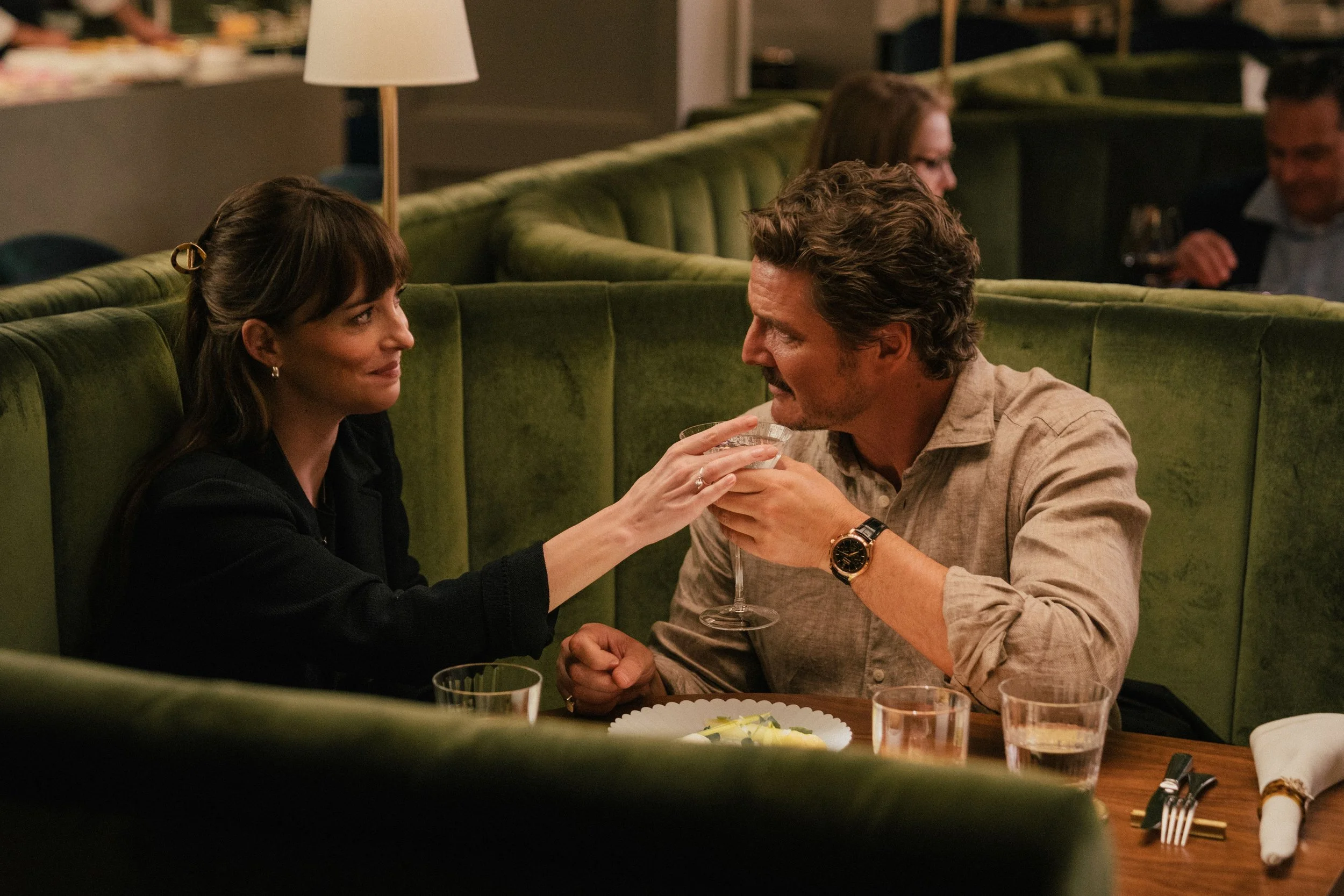Reel Review: Materialists Is Not What You Expect, And That Is A Good Thing
Pedro Pascal, Chris Evans, and Dakota Johnson make up the cast of Celine Song’s newest romance film garnering lots of buzz and disagreements. Lucy (Dakota Johnson), a NYC matchmaker, seeing the world of dating as strictly a numbers game both in terms of matches and succeeding in finding a partner. Torn between what she believes to be the right way to date, and following her heart, she invests time in pursuing Harry (Pedro Pascal), a ten out of ten on paper. When John (Chris Evans), reenters her life, Lucy must face that love is not all about numbers, and there are some things you cannot predict.
While Materialists was marketed as a new spin on the traditional romantic comedy, expectations were set. As an audience member, I knew better than to believe that A24 and Celine Song would release a middle of the road cheesy romcom. While general audiences felt lied to and misdirected, the marketing strategy is a bit genius. Much like dating, a movie is what you are told it is when you go in. A studio presents a trailer, clips, and marketing materials that sell you on a certain idea, enough to make you buy a ticket and head to the theater. This is a reflection of modern dating, we market ourselves on social media or dating apps to convince someone to meet us in person. Rarely, if ever, does the marketed idea fully align with the end product or person. We put out a curated idea of who we should be in order to get buy in from others.
While this movie was posed as a romantic comedy, it is truly a romantic drama. Celine Song once again writes such deep and real characters whose interactions feel authentic. Lucy, played by Dakota Johnson, fully encapsulates the general perceptions around modern day dating. Everything is measured in numbers that combine into a value that is then used to match people basically like an algorithm. The cynicism these days around dating is all too real and is a reflection of the largely algorithm based services that are engrained into daily life.
Harry, played by Pedro Pascal, poses the idea of the perfect man. Someone that all women aspire to be with, but rarely does that man exist, and if he does, he is rare. It is only until about halfway through the movie that we learn about Harry’s personal journey with leg surgery to become taller and how much that increased his value, not only in dating but in life as a whole. Women feel so much pressure to look perfect, and its hard to ignore the fact that those expectations are also put on men, just in different ways. As much as people claim to not put so much value upon looks, it is the first impression we all get either in person or on an app. Pascal’s insecurity about his height is not just about physical looks, but how it is transferred to personal confidence.
John, played by Chris Evans, is the lovesick ex who cannot seem to get his life together. He however offers something different than Harry, true love. He may not be able to support Lucy financially or give her all that she deserves, but he is able to support her in ways that Harry cannot. Materialists begs the question, is love enough? In a world where people are valued upon their material assets, are the intangible things enough to keep two people together and happily?
While the internet is quick to label this movie as ‘broke boy propaganda’ I beg people to take a closer look. Is a man’s income really the only measure of value? A lot of fans reactions also comes into play due to the actors and how their personal thoughts or feelings about Pedro and Chris compare, but again I beg you to look deeper. If the two characters looked exactly alike, no celebrity involved, how would you react to Lucy’s choice? If your best friend lived through the same predicament, would you be supportive? While movies can be an idealistic way of approaching an idea like modern dating, there is a lot of truth to this movie and cause for personal reflection.
One of the main subplots of this movie revolves around the risks of dating and how serious or unserious it can be. While going on a date seems like a harmless act, it can lead to some horrible things. John points out that it’s just dating and isn’t that serious, but why isn’t love that serious? Why as a society have we dumbed down and ridiculed the idea of falling in love with someone when it is something every human being longs for? In a modern dating landscape where hookup culture is rampant, love seems like the unattainable thing that everyone wants but is too afraid to pursue. Dating is a risk, falling in love is a risk, getting married is a risk, but the value we should be placing is on the reward. The question shouldn’t be “can I afford to be in love?” but rather “can I afford not to?”
Materialists is playing in theaters now.



